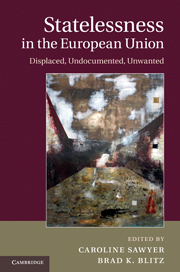Book contents
- Frontmatter
- Contents
- List of contributors
- List of cases
- List of conventions, covenants and treaties
- Acknowledgements
- List of abbreviations and acronyms
- PART I The issue
- PART II The research project
- 6 Research design and methodology of the country studies
- 7 De facto statelessness in the United Kingdom
- 8 Non-citizens in Slovenia: erasure from the register of permanent residents
- 9 The statelessness issue in Estonia
- 10 The sans papiers in France
- 11 Analysis: the practical and legal realities of statelessness in the European Union
- 12 Conclusions
- Bibliography
- Index
7 - De facto statelessness in the United Kingdom
from PART II - The research project
Published online by Cambridge University Press: 17 February 2011
- Frontmatter
- Contents
- List of contributors
- List of cases
- List of conventions, covenants and treaties
- Acknowledgements
- List of abbreviations and acronyms
- PART I The issue
- PART II The research project
- 6 Research design and methodology of the country studies
- 7 De facto statelessness in the United Kingdom
- 8 Non-citizens in Slovenia: erasure from the register of permanent residents
- 9 The statelessness issue in Estonia
- 10 The sans papiers in France
- 11 Analysis: the practical and legal realities of statelessness in the European Union
- 12 Conclusions
- Bibliography
- Index
Summary
The United Kingdom: changing statuses in a country of historical immigration
The legal context for those without immigration status has changed fundamentally in the United Kingdom in recent decades; in British legal terms, this is a very short time scale. The issue is perhaps a bigger one, though – until the later twentieth century, the British law of belonging was structured as befitted a country of immigration that had acquired an Empire. Its inclusive approach to belonging encompassed anyone who chose to make a life in the United Kingdom, and the formal nationality structure was also inclusive, encompassing anyone born in the territory. The principle that anyone ‘born within the dominion or allegiance’ of the monarch was British was affirmed in Calvin's Case in 1608 and confirmed by codification in the British Nationality and Status of Aliens Act 1914. Nationality by descent and naturalisation processes were gradually established. Anyone born within the British Empire, which at one point covered about 20 per cent of the world, was British and could come to and live in the United Kingdom. By the end of the Second World War in 1945, the number of British people who could come and live in the United Kingdom and exercise all civic rights there was about 600,000,000. After the Second World War, Britain began shed most of her colonies, and with them their people.
- Type
- Chapter
- Information
- Statelessness in the European UnionDisplaced, Undocumented, Unwanted, pp. 160 - 194Publisher: Cambridge University PressPrint publication year: 2011



